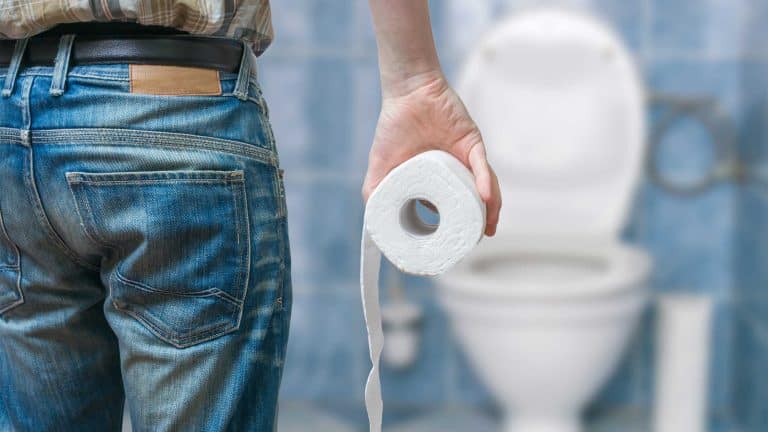Alcohol And Diarrhea | 5 Causes Of Diarrhea After Drinking Alcohol
- Dehydration
- High Carb & Sugar Content
- Faster Digestion
- Inflammation
- Bacterial Imbalance
- Constipation
- Treating Alcohol-Related Diarrhea

A night of heavy drinking can take a toll on the human body, triggering well-known hangover symptoms ranging from light and sound sensitivity to exhaustion, dehydration, nausea, vomiting, vertigo, irritability, and more.
Alcohol-related diarrhea is one of these potential symptoms, especially among individuals with preexisting bowel diseases (commonly celiac disease, irritable bowel syndrome (IBS), and Crohn’s disease).
Diarrhea may also occur in those experiencing a high level of anxiety and physical agitation, or those with irregular sleep cycles or a significant sleep deficit.
Five potential causes of alcohol-induced diarrhea include:
1. Dehydration
Alcohol is a diuretic, meaning that it boosts urine production and forces water out from the body much faster than normal.
This is why heavy drinking leads to such frequent trips to the bathroom. And, if your body can’t keep up, it may use diarrhea to expel unwanted fluid even more quickly.
2. High Carb & Sugar Content
Sugar-laden cocktails, wine, and hard cider can also signal the gut to expel water and electrolytes, loosening bowel movements and potentially leading to diarrhea (depending on your body’s reactivity and your recent sugar consumption).
High-carbohydrate drinks can also be problematic as the body may not have the time to properly process and digest these drinks—they flood through the gastrointestinal tract and are fermented by gut microbes, leading to gas, cramping, and unpredictable stools.
Beer can also trigger uncomfortable gastrointestinal reactions in those with gluten sensitivity.
3. Faster Digestion
Acute exposure to alcohol increases peristalsis, the contraction of the muscles around the large intestines.
This increased motility puts pressure on the contents of the colon, speeding the movement of material through your lower digestive tract and often expelling it before it is fully digested. Without properly balancing the fluid content first, it can result in watery stool or diarrhea.
4. Inflammation
When a large amount of alcohol reaches the stomach suddenly, it can directly irritate the tissue of the stomach lining and prompt the stomach to increase acid production.
This can irritate the tissue of the intestines below in turn, especially if you’re drinking on an empty stomach, which can cause the body to absorb a much higher dose of alcohol more quickly.
As a result, alcohol may aggravate the entire gastrointestinal system, leading to diarrhea as the body attempts to get rid of the offending substance, whatever the cost.
5. Bacterial Imbalance
Alcohol is hard on human tissue, but it can be even more disruptive to microscopic bacteria.
These gut microbes are, by and large, helpful and necessary members of your bodily ecosystem. They help you process materials that human cells can’t deal with on their own and keep your gut working normally.
Alcohol, and wine in particular, can devastate certain portions of your gut microbiome and cause others to grow out of control, leading to gas, bloating, and throwing your internal biology out of balance.
This culminates in periods of poor digestion and potentially loose stools continuing until your gut bacteria even out and restore your digestion to normal.
Alcohol Misuse & Constipation
While binge drinking and heavy drinking often cause short-term diarrhea by accelerating digestion and fluid removal past the norm, chronic misuse of alcohol can have the opposite effect, leading to constipation.
Alcohol is a diuretic and causes the body to expel fluids and lead to dehydration. And when dehydrated, the body will look for whatever moisture it can find to make up the deficit, sucking fluid out of the bowel and leaving the poop inside dry, hard, and difficult to pass.
This, in combination with alcohol’s overall depressant effects on the central nervous system including digestive function, makes chronic constipation a common symptom experienced by those with alcohol use disorder (AUD).
Treating Alcohol-Related Diarrhea
There are a number of treatment options available to limit or treat episodes of diarrhea related to alcohol intake, including:
- drinking plenty of water during and after a night of drinking
- taking Pepto-Bismol, Imodium, or other over-the-counter antidiarrheal medications
- avoiding any specific type of alcohol or alcoholic drink that has caused you digestive problems in the past
- improving your sleep, diet, and nutrition
- moderating or eliminating problematic alcohol consumption
To learn about our addiction treatment services for alcohol use disorder, please contact us today.
Written by Ark Behavioral Health Editorial Team
©2024 Ark National Holdings, LLC. | All Rights Reserved.
This page does not provide medical advice.
Addiction Biology - Alcohol‐related diarrhea
Centers for Disease Control and Prevention (CDC) - Chronic Diarrhea
Mayo Clinic - Diarrhea - Symptoms and causes

Questions About Treatment?
Ark Behavioral Health offers 100% confidential substance abuse assessment and treatment placement tailored to your individual needs. Achieve long-term recovery.
100% confidential. We respect your privacy.
Prefer Texting?
Our friendly support team is here to chat 24/7. Opt out any time.







 Learn More
Learn More








